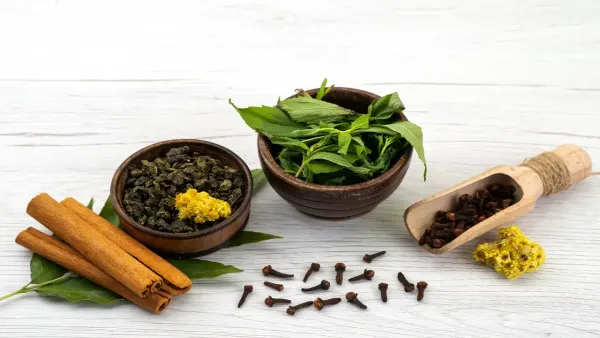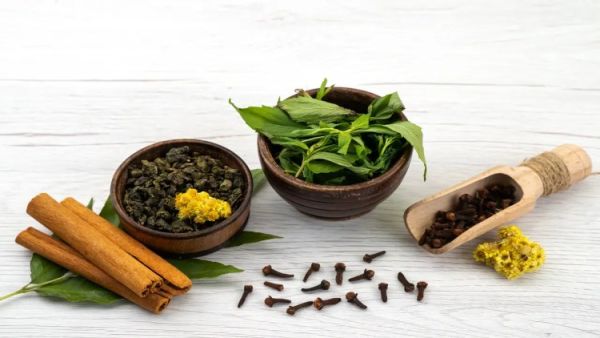
The Indian traditional medical system known as Ayurveda provides a comprehensive method of treating seasonal allergies throughout the monsoon season. It aims to improve the immune system, lessen allergy symptoms, and balance the body’s doshas (Pitta, Kapha, and Vata).

A Few Ayurvedic Herbal Treatments That Help With Monsoon Allergies
Holy basil, or tulsi: Holy basil, often referred to as tulsi, is well recognized for its potent anti-inflammatory and immune-boosting qualities. You may improve the health of your respiratory system and successfully reduce allergy symptoms by including tulsi leaves in your diet or drinking tulsi tea.
Turmeric: Curcumin, the key ingredient in turmeric, has strong anti-inflammatory and antioxidant properties. Including turmeric in your food or making turmeric milk (golden milk) may significantly reduce allergic responses and the pain they cause.
Ginger: Another great anti-inflammatory plant that might help relieve allergy symptoms is ginger. Whether you drink ginger tea or include it into your cooking, it may help reduce inflammation and congestion, which can lessen allergic reactions.
Licorice Root: Licorice root is a useful medicine because of its natural anti-allergic and anti-inflammatory properties. Whether taken as a calming tea or as a powder under a skilled practitioner’s supervision, licorice root may successfully reduce allergy symptoms.
Triphala is a combination of three fruits: Haritaki, Bibhitaki, and Amalaki (Indian gooseberry). Triphala is essential for promoting the body’s detoxification and digesting systems. Triphala helps to lessen allergy responses by supporting these essential processes. It may be consumed by mixing it with warm water or as a supplement.
Neem: Neem is a potential treatment for allergies because to its strong antihistamine and anti-inflammatory qualities. The immune system’s reaction to allergens may be considerably strengthened by consuming neem tea or neem pills.
Honey: Because of its immune-boosting properties, Ayurveda has long recommended local, raw honey. By regularly consuming a spoonful of honey, you may be able to lessen the effects of allergies by desensitizing your body to local pollen.
Neti Pot: Utilizing a neti pot in conjunction with warm saline water is a useful method for unclogging nasal passages and reducing allergy-related congestion. This little exercise may provide significant pain relief.
By inhaling steam that has been infused with eucalyptus or mint oil, you may significantly lessen the influence of allergens on your breathing by relieving respiratory congestion and calming inflamed nasal passages.
Ayurvedic Herbal Formulas: Qualified Ayurvedic practitioners may suggest certain Ayurvedic formulations, such as Sitopaladi Churna, Talisadi Churna, and Yashtimadhu (licorice) Churna, to treat allergy symptoms. These formulas are designed to provide complete relief by addressing the underlying causes of allergic responses.
Keep in mind that using Ayurvedic treatments requires professional supervision, particularly if you are taking other drugs or have pre-existing medical issues. Before adding any new treatments to your regimen, it’s crucial to speak with a healthcare provider. Seasonal allergies may also be managed by following other Ayurvedic lifestyle guidelines, such as eating a balanced diet and drinking enough of water.